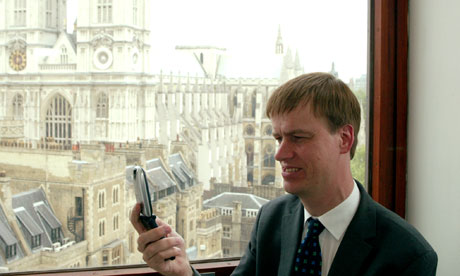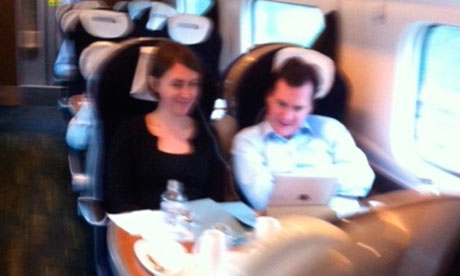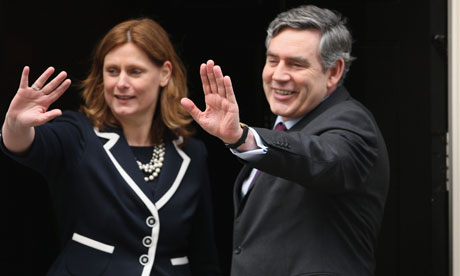Labour accuses government of 'fiddling figures' after ONS data shows 105,000 of total on mostly unpaid back-to-work schemes

'105,000 of claimed
new jobs turn out to be just schemes - this explains why employment
seems to have risen,' said Stephen Timms, the shadow employment
minister. Photograph: Graham Turner for the Guardian
Government claims to have created an additional 500,000 jobs in
the past year have been called into question after it was revealed that
one in five of the people involved are on government work schemes,
including tens of thousands still claiming unemployment benefits.
In the last few months the government has trumpeted "record high" employment and the net creation of half a million jobs over the past year.
But figures obtained by the Guardian from the Office for National Statistics show that just over 20% of this total (105,000) involves those on largely unpaid government back-to-work schemes, the majority of whom are still claiming jobseeker's allowance.
They include unpaid workers doing voluntary and mandatory work experience in supermarkets and charity shops.
Many more tens of thousands with no jobs, training or pay, who simply attend regular job hunt workshops as part of the work programme run by the Department for Work and Pensions, are also being counted as employed.
The ONS, which is responsible for employment figures, says it is following guidelines set out by the International Labour Organisation (ILO) and counts people as employed if they are adding to the nation's economic output, regardless of whether or not they are paid.
But Labour accused the government of "fiddling the figures" by continuing to highlight them.
Ministers said that they were aware of the "quirk" in the system and had asked the ONS to alter its methods but still insisted that it made little difference to the overall picture.
Figures released in November showed that in the year from September 2011 510,000 net jobs had been created in the UK.
In December's autumn statement, the chancellor, George Osborne, highlighted these statistics, saying employment was "at a record high" and that it was forecast to continue to rise, adding that Britain now had "a greater proportion of its people in work than either the eurozone or the US".
But of those "employed", 105,000 were in back-to-work schemes. While people on such schemes have been counted within the employment figures for years, last year there was a dramatic increase in their number. This growth was partly down to new ONS 2012 counting criteria, under which the statisticians stopped tracking people on Labour's back-to-work schemes as the programmes were being wound down, and started tracking those on the new schemes of the coalition.
Though some of the people on government schemes were doing paid work while being helped as part of the work programme's support service, data from the Labour Force Survey, upon which employment figures are calculated, shows that at least 26,305 of these were doing voluntary unpaid work experience.
Overall a substantial majority of the 105,000 were likely to be subsisting on unemployment benefits – given that several DWP schemes are entirely unpaid – and only a minority of people on the work programme would have been in paid work placements.
Paul Bivand, from the research organisation Centre for Economic and Social Inclusion, said: "People who are unemployed should be counted as unemployed, whether or not they are on government schemes.
"The ONS should recognise that people who are not in a paid job, and are required to look for work to get their benefit, are unemployed. Whether they are getting job search help from Jobcentre Plus or work programme providers is immaterial."
A parliamentary answer from the ONS director general, Glen Watson, given in October last year, confirms that even if people were claiming jobseeker's allowance, they could still be counted as employed.
He said: "Those participants [in government schemes] whose activity comprises any form of work, work experience, or work-related training, are classified as in employment. This is regardless of whether the individual is paid or not."
Shortly after taking office in the last reshuffle in the autumn, the employment minister, Mark Hoban, wrote to the ONS director general seeking a change in the organisation's methods, saying he was "surprised to discover that a number of people on government programmes are classed as in employment".
Hoban wrote: "Many people struggle with the idea that someone in work-based training or a period of work experience can be categorised [as employed]."
The DWP dismissed as ridiculous any suggestion that it was creating back-to-work schemes involving work experience to boost overall job figures, saying its record of trying to deliver transparent figures spoke for itself.
Hoban said: "The fact is that there are 700,000 extra people in work compared to 2010 and unemployment has been falling since last spring. Any quirk in the way a small number of people on our schemes are counted makes little difference.
"These figures are independent of government and were collected in the same way under the previous administration, but I want them to be absolutely transparent which is why I've already raised this issue with the ONS last year."
The shadow employment minister, Stephen Timms, said that the government had been caught "fiddling employment figures".
He said: "105,000 of the claimed new jobs turn out to be just schemes. This helps to explain why employment seems to have risen when there has been no growth.
"Ever since the election ministers have accused the last government of fiddling employment figures – now they have been caught red-handed themselves."
Asked whether it was appropriate to count those on the jobseeker's allowance as employed, an ONS spokesperson said: "The classification of people as either employed, unemployed or economically inactive is based on an internationally agreed set of guidelines.
"This approach has been applied as consistently as possible to our labour market statistics for over 20 years, despite many changes to government training programmes and work-related benefits.
"The criteria are reviewed on a regular basis although no fundamental changes are expected in the foreseeable future."
In the last few months the government has trumpeted "record high" employment and the net creation of half a million jobs over the past year.
But figures obtained by the Guardian from the Office for National Statistics show that just over 20% of this total (105,000) involves those on largely unpaid government back-to-work schemes, the majority of whom are still claiming jobseeker's allowance.
They include unpaid workers doing voluntary and mandatory work experience in supermarkets and charity shops.
Many more tens of thousands with no jobs, training or pay, who simply attend regular job hunt workshops as part of the work programme run by the Department for Work and Pensions, are also being counted as employed.
The ONS, which is responsible for employment figures, says it is following guidelines set out by the International Labour Organisation (ILO) and counts people as employed if they are adding to the nation's economic output, regardless of whether or not they are paid.
But Labour accused the government of "fiddling the figures" by continuing to highlight them.
Ministers said that they were aware of the "quirk" in the system and had asked the ONS to alter its methods but still insisted that it made little difference to the overall picture.
Figures released in November showed that in the year from September 2011 510,000 net jobs had been created in the UK.
In December's autumn statement, the chancellor, George Osborne, highlighted these statistics, saying employment was "at a record high" and that it was forecast to continue to rise, adding that Britain now had "a greater proportion of its people in work than either the eurozone or the US".
But of those "employed", 105,000 were in back-to-work schemes. While people on such schemes have been counted within the employment figures for years, last year there was a dramatic increase in their number. This growth was partly down to new ONS 2012 counting criteria, under which the statisticians stopped tracking people on Labour's back-to-work schemes as the programmes were being wound down, and started tracking those on the new schemes of the coalition.
Though some of the people on government schemes were doing paid work while being helped as part of the work programme's support service, data from the Labour Force Survey, upon which employment figures are calculated, shows that at least 26,305 of these were doing voluntary unpaid work experience.
Overall a substantial majority of the 105,000 were likely to be subsisting on unemployment benefits – given that several DWP schemes are entirely unpaid – and only a minority of people on the work programme would have been in paid work placements.
Paul Bivand, from the research organisation Centre for Economic and Social Inclusion, said: "People who are unemployed should be counted as unemployed, whether or not they are on government schemes.
"The ONS should recognise that people who are not in a paid job, and are required to look for work to get their benefit, are unemployed. Whether they are getting job search help from Jobcentre Plus or work programme providers is immaterial."
A parliamentary answer from the ONS director general, Glen Watson, given in October last year, confirms that even if people were claiming jobseeker's allowance, they could still be counted as employed.
He said: "Those participants [in government schemes] whose activity comprises any form of work, work experience, or work-related training, are classified as in employment. This is regardless of whether the individual is paid or not."
Shortly after taking office in the last reshuffle in the autumn, the employment minister, Mark Hoban, wrote to the ONS director general seeking a change in the organisation's methods, saying he was "surprised to discover that a number of people on government programmes are classed as in employment".
Hoban wrote: "Many people struggle with the idea that someone in work-based training or a period of work experience can be categorised [as employed]."
The DWP dismissed as ridiculous any suggestion that it was creating back-to-work schemes involving work experience to boost overall job figures, saying its record of trying to deliver transparent figures spoke for itself.
Hoban said: "The fact is that there are 700,000 extra people in work compared to 2010 and unemployment has been falling since last spring. Any quirk in the way a small number of people on our schemes are counted makes little difference.
"These figures are independent of government and were collected in the same way under the previous administration, but I want them to be absolutely transparent which is why I've already raised this issue with the ONS last year."
The shadow employment minister, Stephen Timms, said that the government had been caught "fiddling employment figures".
He said: "105,000 of the claimed new jobs turn out to be just schemes. This helps to explain why employment seems to have risen when there has been no growth.
"Ever since the election ministers have accused the last government of fiddling employment figures – now they have been caught red-handed themselves."
Asked whether it was appropriate to count those on the jobseeker's allowance as employed, an ONS spokesperson said: "The classification of people as either employed, unemployed or economically inactive is based on an internationally agreed set of guidelines.
"This approach has been applied as consistently as possible to our labour market statistics for over 20 years, despite many changes to government training programmes and work-related benefits.
"The criteria are reviewed on a regular basis although no fundamental changes are expected in the foreseeable future."







